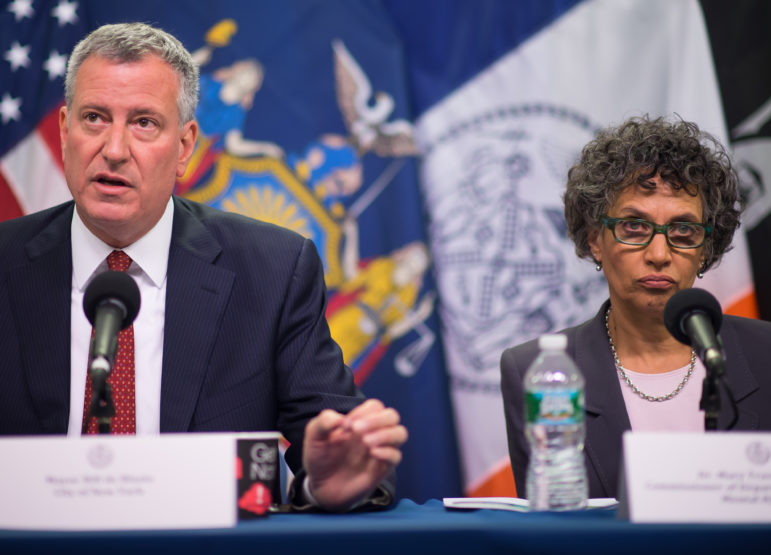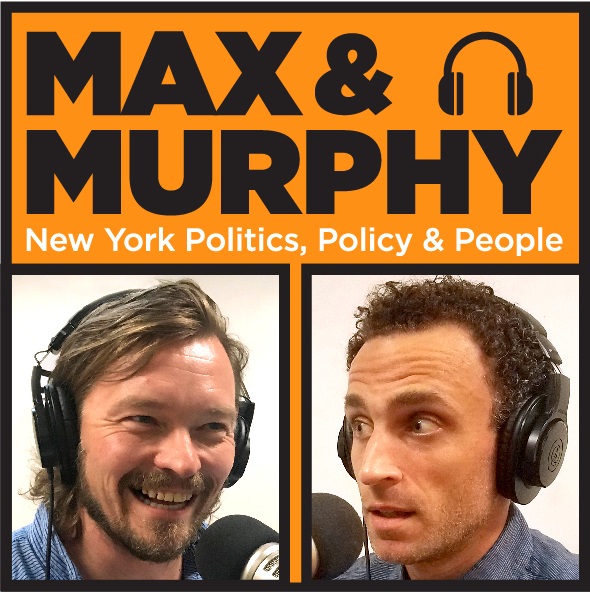
Rob Bennett/Mayoral Photography Office
Dr. Mary Bassett, as city health commissioner, seen with Mayor de Blasio during the 2014 Ebola scare.The mounting death toll from COVID-19 is shocking and the economic devastation wrought by the health crisis stuns at every turn. But to Dr. Mary Bassett, who helped New York City navigate earlier encounters with Ebola, Legionnaires’ disease and Zika, the damage inflicted by the coronavirus is not entirely surprising.
“I would say that it’s entirely predictable that there’s a massive outbreak in the United States. We had galloping inequalities for decades now,” Bassett, who now serves as the director of the François-Xavier Bagnoud Center for Health and Human Rights at Harvard University, told WBAI’s Max & Murphy Show on Wednesday. “We have many people who work under precarious circumstances and can’t afford to not go to work. … Astoundingly, among wealthy nations, we have no national health insurance. Even before the job losses associated with COVID, 28 million people between the ages of 18 to 65 are underinsured.”
“The cost of housing means that many people, not only low-income people, live in quite crowded circumstances where the public health advice to stay six feet away just doesn’t make sense,” she continued. “All these were a set up for this highly contagious virus.”
Bassett served as health commissioner from 2014 to 2018, and helped make health disparities a focus of city policy. Those inequities have an everyday impact, in the form of obesity, hypertension, asthma and other chronic conditions. But the inequalities come into sharp relief during a crisis.
“Epidemics uncover the fissures in our society. That’s what epidemics do, and it reflects not just people’s ability to get healthcare, which we all should have a right to, but also the ability for people being able to live decent lives,” Bassett said. “We need equity not just in health outcomes but in all aspects of everyday life: housing, transportation, access to healthy food; all of these are part of what it means to have your health.”
According to data released by the city last week based on a majority of COVID-related death certificates produced so far, the death rate per 100,000 people is far higher for New York City’s Latinos (22.8 per 100,000) and Blacks (19.8) than for Whites (10.2) and Asians (8.4).
Beyond the vulnerabilities created by social failures, Bassett lay the blame for COVID’s toll largely at the foot of federal officials, who were slow to get tests out to cities and states during the early days when the virus might have been isolated and contained. She also noted that the coronavirus is a particularly difficult enemy to understand and combat.
“The thing people really have trouble getting their head around is exponential spread. I had trouble getting my head around it. You can understand how someone might say, ‘ we only have four cases or ten cases. That is not the right way to think of a virus or any communicable agent that spreads exponentially, meaning that each person infects more than one person … We just haven’t seen an infectious agent like this novel coronavirus. It’s just highly contagious and that’s why it’s spreading so widely. Ebola was very different. It was spread only by contact with body fluids. It wasn’t spread through the air, by walking by somebody with Ebola. We knew that in this country with our capacity as disease detectives and our resources that there would not be an ongoing transmission of Ebola in our country.”
Bassett has joined many others in calling for broader steps to release detainees and inmates from jails and prisons. The risk of spread in a crowded correctional facility, where distancing and hand-washing are difficult to achieve, is just too great, she argued—and the consequences too severe.
“The cost will be measured in lives. It already has been, with people who may not even have been sentenced (in the case of Rikers) effectively experiencing a death sentence, “ Bassett said.
Listen to our conversation below, or hear the full program, which includes an interview with State Sen. Michael Gianaris about his proposal to “cancel rent.”
Dr. Mary Bassett on COVID-19 and social failures
Max & Murphy: Full Show of April 15, 2020
Max & Murphy is heard every Wednesday at 5 p.m. on WBAI, 99.5 FM. Ben Max is the co-host, Reggie Johnson the engineer and Anika Chowdhury the intern.










